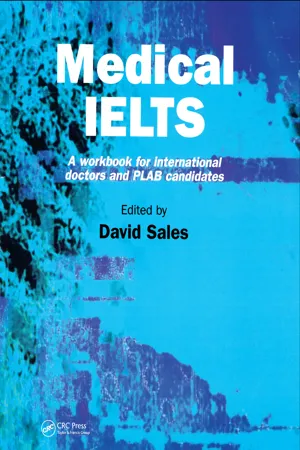
- 204 pages
- English
- ePUB (mobile friendly)
- Available on iOS & Android
About this book
In which occupation are you?' 'From how long have you been smoking?' 'Do you take any alcohol/drinks?' All overseas qualified doctors who apply for registration in the UK must satisfy the General Medical Council that they have the necessary knowledge of English, by obtaining a satisfactory score in the International English Language Testing System (IELTS) examination. This interactive workbook provides a wide range of questions and answers on this subject, containing specific medical sections to address the common problems and pitfalls relating to vocabulary and fluency in everyday medical consultations. Overseas qualified doctors needing to take the IELTS examination in order to be eligible for the GMC PLAB examination, which is required for practice in the UK, will find this book essential for their study.
Frequently asked questions
- Essential is ideal for learners and professionals who enjoy exploring a wide range of subjects. Access the Essential Library with 800,000+ trusted titles and best-sellers across business, personal growth, and the humanities. Includes unlimited reading time and Standard Read Aloud voice.
- Complete: Perfect for advanced learners and researchers needing full, unrestricted access. Unlock 1.4M+ books across hundreds of subjects, including academic and specialized titles. The Complete Plan also includes advanced features like Premium Read Aloud and Research Assistant.
Please note we cannot support devices running on iOS 13 and Android 7 or earlier. Learn more about using the app
Information
Part One
1 Communication with patients: general points
Greeting and introduction (see also Module 31: Useful interview expressions and Module 40: Healthcare)
Presenting problem and addressing patients’ concerns
Pain
2 History taking
Occupations (jobs) and certificates (sick notes) (see also Module 36: Work and Module 37: Money and finance)
Communication
Cigarettes (smoking)
Communication
Table of contents
- Cover
- Title Page
- Copyright Page
- Table of Contents
- Introduction
- Part One
- Part Two
- Answers
- Appendix: Registration with the General Medical Council (GMC)
- Vocabulary record sheet